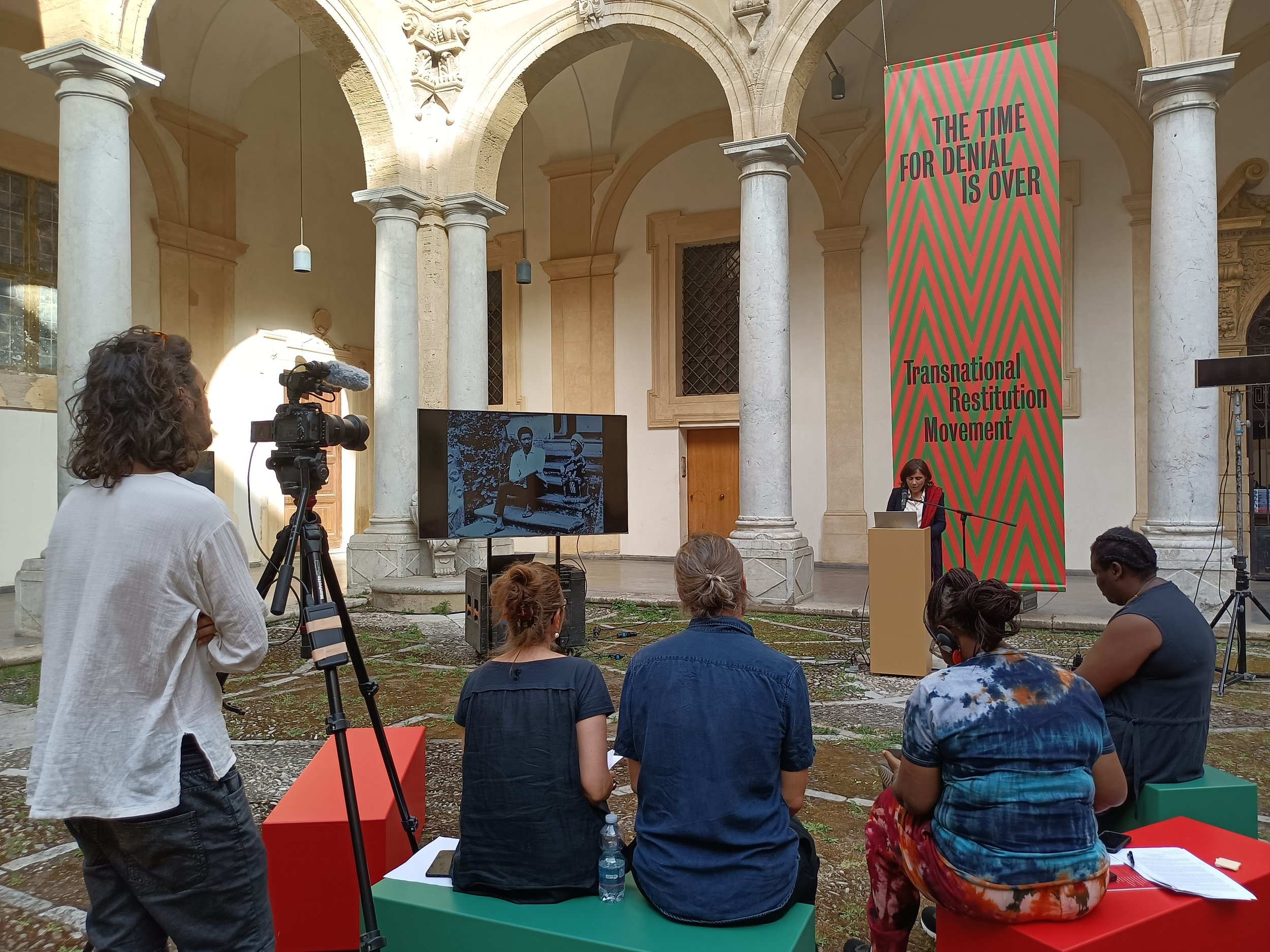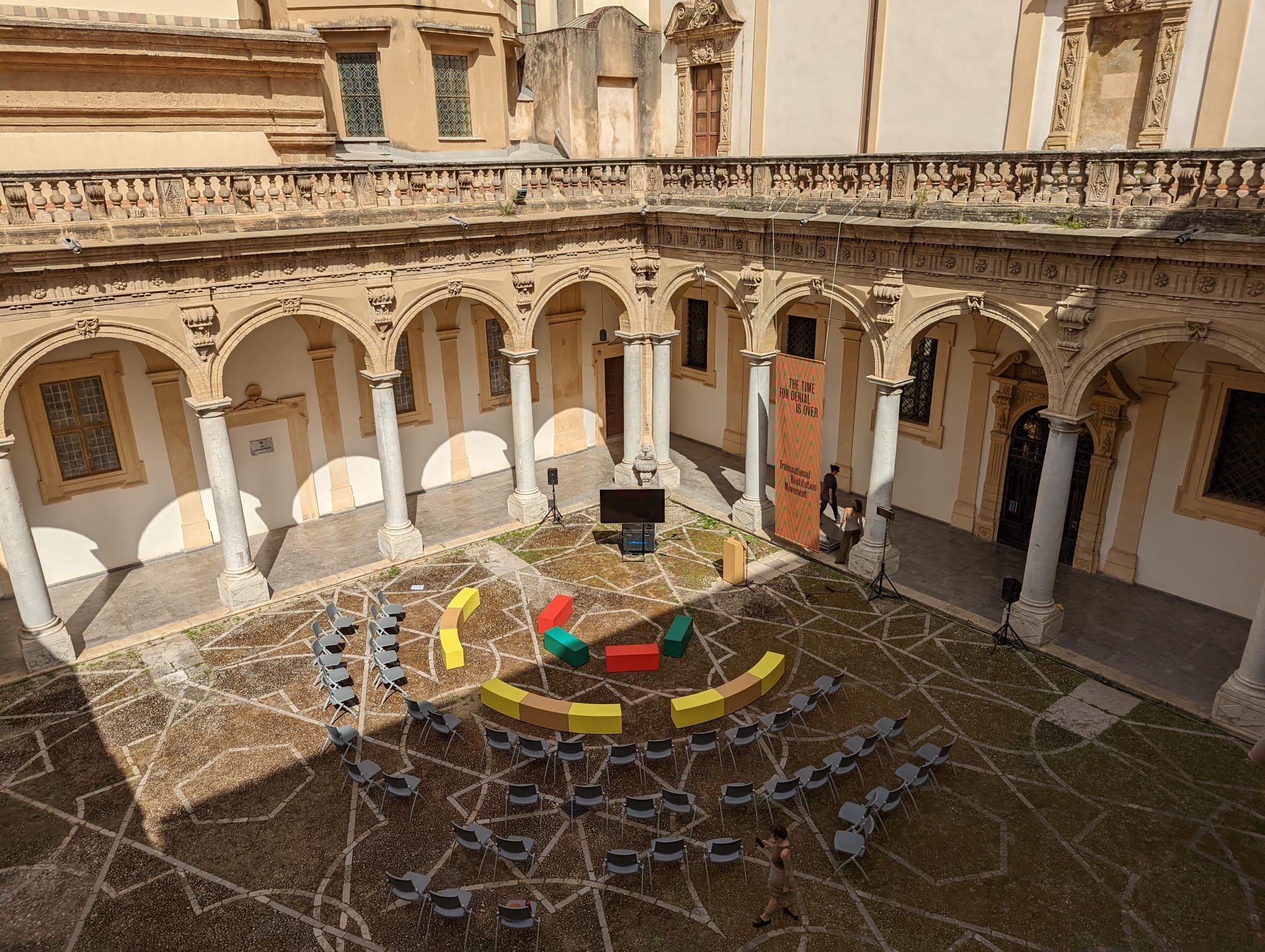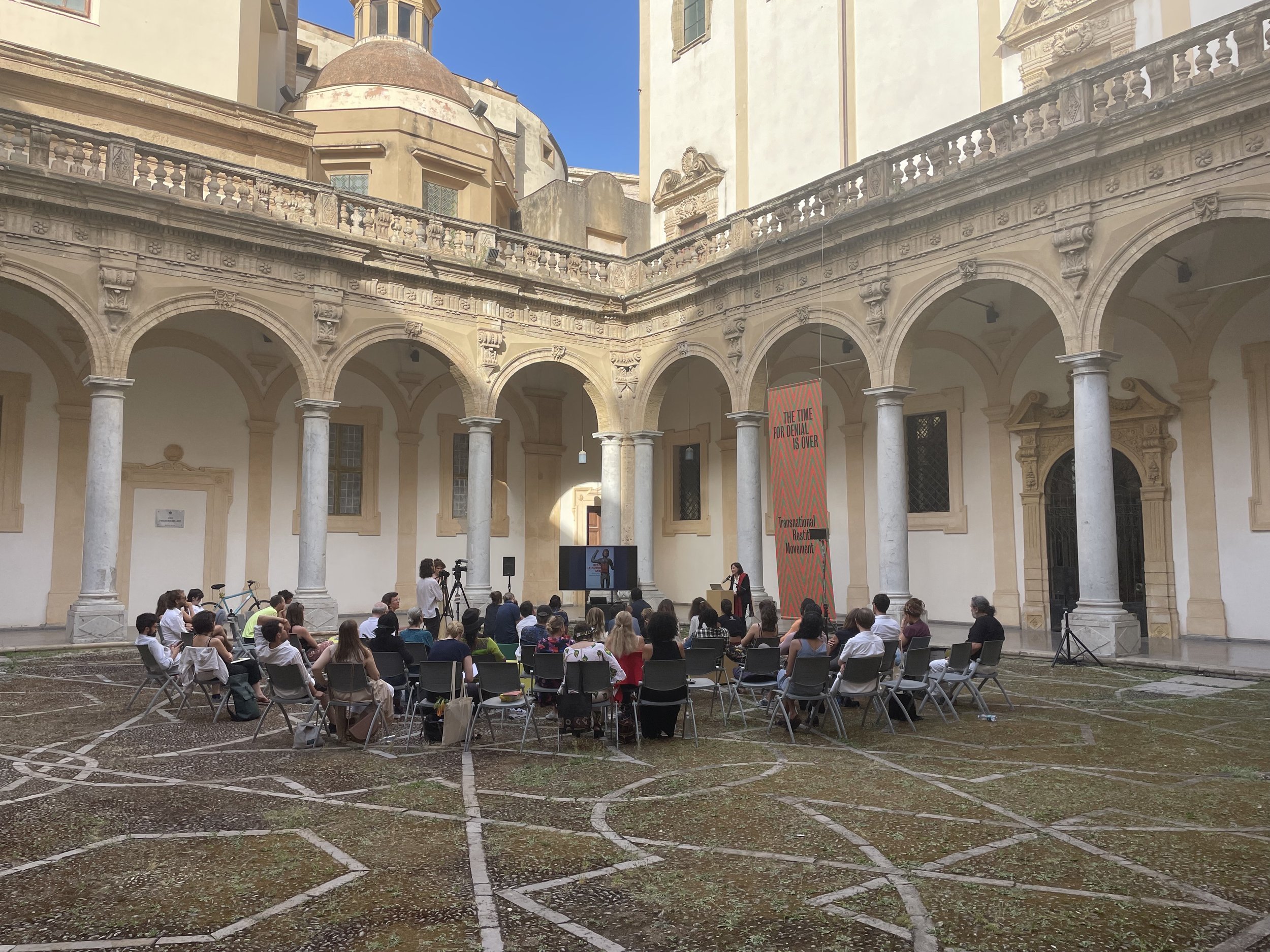The Time For Denial Is Over - Palermo
Transnational Restitution Movement
curated by Studio Rizoma and GROUP50:50
With the recent return of the Benin Bronzes by the two European museums with the largest collections of African art, it became evident – we are entering a new era of postcolonial debate. In this context, GROUP50:50 and Studio Rizoma invite artists, activists and thinkers from Europe and Africa to set the foundations for abroad transnational restitution movement. In a series of lessons, pieces, and interventions we present and discuss artistic and political practices redefining both African and European identities and reframing transcontinental dialogue and cooperation.
Since the 1960s, a movement of globally connected artists, intellectuals and activists has been persistently campaigning for the restitution of African cultural artefacts and ancestral remains to bring forward the process of decolonization after independence. After a long period of stagnation, thedebate has accelerated in recent years, with examples of physical restitution asthe Behanzin treasures tothe Republic of Benin orthe Benin Bronzes to Nigeria. While actual restitution will be decided at the highest diplomatic level and delayed for as long as possible, it will be up to artists and civil society to accelerate and accompany this process. The time has come to follow those who have led the wayfora broad and transnational movement. How cantheseobjects be returned in their symbolic, social and historical significance? How can it be linked to contemporary contexts of knowledge production and social interaction?
Once you leave the European perspective, skulls and skeletons become more than scientific objects and masks more than art objects. They are inhabited by ancestral spirits brutally removed from their habitat, locked away in forgotten collections and still haunting the European continent. With the process of restitution, we must learn, in Europe and in the former colonies, to dialogue about the long history of physical violence, economic exploitation, alienation, cultural appropriation and dislocation of these objects that produced meaning. What rituals can we invent to accompany the return of the objects? How can we reverse a process of alienation induced by hegemonic euro-centric thinking imposed by colonial violence?
The destabilisation of social structures through the expropriation of objects with cultural value or symbolic power enabled the exploitation of humans and nature. Modernist ideas of progress and the subsequent separation of “advanced” and “primitive” societies, the imperative of economic growth and the infinite availability of natural resources, annihilated any alternative cosmology that defined the relationship between humans and nature differently. Should the restitution movement also claim the restitution of natural resources? Who pays for the ongoing destruction of the habitat caused by the exploitation of natural resources? And would it not be better for humanity if alternative cosmologies could be restored?
GROUP50:50and Studio Rizoma invite artists, activists and thinkers from Europe and Africa that represent the avant-garde of a transnational restitution movement to present and discuss their practices. After the first stage in Palermo, the protagonists of the "Transnational Restitution Movement" will travel on to Leipzig, Lubumbashi, Kinshasa and Berlin during 2022 and 2023. In each city, they involve the local artists and activists in their reflections and artistic production to take the transnational restitution movement forward.
“The Time For Denial Is Over”is a project of GROUP50:50(Basel-Lubumbashi), Fondazione Studio Rizoma (Palermo), Centre d’Art Waza (Lubumbashi) and European Alternatives, in collaboration with PODIUM Esslingen, The European Pavilion, CTM Festival Berlin, euro-scene Leipzig, Kaserne Basel and Vorarlberger Landestheater.
After the opening event in Palermo, "The Time For Denial Is Over" travels to Basel, Bregenz, Leipzig, Berlin, Kinshasa and Lubumbashi.
FIRST SESSION: The Arduous Transformation of Institutions
The European and African museums and the political institutions that decide on restitution are changing very slowly. Hegemonic ideas have been deposited in layers, and structural inequalities continue to reproduce today. How can we contribute to their transformation from inside and outside the institutions? Moderated by: Emmanuelle Spiesse
Lesson#1 Parlons des Mensonges Institutionnels – Bénédicte Savoy, Art Historian, Berlin
Bénédicte Savoy has shaped the restitution debate of recent decades. Together with the Senegalese author Felwine Sarr, she wrote a revealing and groundbreaking report on the restitution of cultural heritage commissioned by the French President Emmanuel Macron.
Lesson#2 Dealing with a Fragmented Heritage – Peju Layiwola, Visual Artist, Lagos
Peju Layiwola is an artist and professor of art history. Her work focuses on the looting and restitution of cultural heritage from the Kingdom of Benin (Nigeria) and memory culture, voids, and postcolonial continuities. She is the curator of various exhibitions, including I MISS YOU, at Rautenstrauch Joest Museum, Cologne, that prepares the restitution of 96 objects from the museum's collection to Nigeria.
Lesson#3 Continuous Repositioning – Leone Contini, Artist and Anthropologist, Rome
The artist and anthropologist Leone Contini has worked extensively on the colonial traces scattered in the deposits and archives of Italian museums, amongst others in the former Colonial Museum in Rome, now Museo delle Civiltà, as well as in the archives of his family who lived in Libya, where his grandfather worked as an archaeologist.
Lesson#4 Radical Education – Sepake Angiama, Curator and Educator, London
Sepake Angiama has developed educational programmes for various institutions, including Tate Modern, documenta 14 and Manifesta12. She is the artistic director of the Institute of International Visual Arts (Iniva), dedicated to developing artistic research, collective study, publishing and commissioning that reflects on the social and political impact of globalisation.
Screening – You Hide Me – Nii Kwate Owoo
In 1970, the Ghanaian filmmaker Nii Kwate Owoo spent a day filming in the basement archives of the British Museum. In 1971, his film You Hide Me was banned in Ghana for being “anti-British”, ironically resulting in a headline published by the influential London-based magazine West Africa that announced the film to the rest of the world. More than half a century later, You Hide Me was awarded the Best Documentary Prize at the Paris Short Film Festival 2020.
Talk Series – SECOND SESSION: Speak to the Dead and the Spirits!
When anthropologists, doctors and warlords passed on African masks and ritual objects, skulls and skeletons to European museums, they robbed these objects of their spiritual meaning. The relationship between humans, the spirits of ancestors and nature was declared superstition. How can we rediscover the relationship between humans and spirits? Moderated by: Eva-Maria Bertschy
Lesson#5 Qui est le Voleur ? – Mwazulu Diyabanza, Political Activist, Paris
In 2020, Congolese activist Mwazulu Diyabanza tried to steal objects from European museums and bring them back to his country. The trial against him was highly publicised in Europe. As a result, he founded the Multicultural Front Against Pillaging to unite the world's indigenous peoples to recover their looted heritage.
Lesson#6 Revisit the Past of Beauty – Christian Nyampeta, Visual Artist, London
In Christian Nyampeta’s film Sometimes it was Beautiful, the spirits of several postcolonial luminaries, a filmmaker, and a high ranking royal of a former colonial empire talk about the “traces of a history that is filled with pain” and the “balance of composition”. The film was, among other places, presented at The Solomon R. Guggenheim Museum in New York.
Lesson#7 Returning the Dead as Humans and Citizens – Ciraj Rassool, Historian, Cape Town
Ciraj Rassool is a Professor of History at the University of the Western Cape, Cape Town and has written many influential books on Africa's cultural heritage. He explores how human remains in European museums can be returned and what rituals are used to restore their humanity.
Lesson#8 A Visit of the Mbuti People – Patrick Mudekereza, Curator, Lubumbashi
Patrick Mudekereza, artistic director of Centre d’Art Waza, travelled with GROUP50:50 to the equatorial forest to visit the nomadic Mbuti people. Their music theatre production tells the story of seven "pygmy skeletons" brought to Geneva by a Swiss doctor in the 1950s, a tale of exhumation and displacement.
Lesson#9 The Unburied of the Cimitero Dei Rotoli – Caterina Pasqualino, Anthropologist and Filmmaker, Palermo / Paris
In her current project, the Palermitan anthropologist and filmmaker Caterina Pasqualino focuses on the scandal of the unburied in the Cimitero di Santa Maria dei Rotoli. She takes this as an opportunity to talk to Palermitans from different communities about their funeral rituals and their relationship to the dead.
Screening – Return: An Epic Journey – Rita Mukebu
Inspired by the African masks in the Rietberg Museum in Zurich, the Swiss artist Lukas Stucky designed a mask and asked the Congolese artist Rita Mukebo to give it the status of an artwork. In a short film produced by Centre d’Art Waza Lubumbashi, Mukebu tests the relevance of the mask by visiting the Tshokwe community, the art museum director, a university professor, and others.
Return: An Epic Journey. Directed by Rita Mukebu. Produced by Centre d’Art Waza, Lubumbashi, 2021. 15 min.
Screening – Sometimes It Was Beautiful – Christian Nyampeta
A film by artist Christian Nyampeta, about a meeting between improbable friends, gathered to watch I fetischmannens spår (In the Footsteps of the Witch Doctor), one of the six Swedish films cinematographer Sven Nykvist made in or about Congo between 1948 and 1952.
Sometimes It Was Beautiful. Directed by Christian Nyampeta, Stockholm, 2018. 38 min.
Talk Series – THIRD SESSION: Colonial Ghosts and Future Landscapes
Colonial history has been imprinted in the landscapes, both in the colonised South and the ruling North. We find hybrid landscapes inhabited by the ghosts of past crimes between devastated mining regions and highly developed oases of prosperity. What will we leave behind in the topography of the future? How can we imagine the restitution of habitats that are being destroyed? Moderated by: Lorenzo Marsili
Lesson#11 Abandoning and Re-connecting Heritage – Emilio Distretti, researcher, writer and educator, London / Basel
Emilio Distretti is a Postdoctoral Fellow in the History and Theory of Architecture and Urbanism at the University of Basel. His research and pedagogy take on interrelated avenues on critical re-use of colonial architectural heritage, reparative justice and decolonial politics in the Mediterranean (Italy, North Africa and the Levant) and in the Horn of Africa.
Lesson#12 Solanum Aethiopicum – Aterraterra, Artist and Farmer Collective, Palermo
Fabio Aranzulla and Luca Cinquemani of the Palermo-based collective Aterraterra have cultivated an eggplant species that arrived in Italy from Ethiopia during colonial times, now fully part of Italy’s cultural heritage. They tell a transnational story between biodiversity, neocolonialism and identitarian narrations.
Lesson#13 Who Owns the Forest? – Remy Zahiga, Climate Activist and Indigenous People Rights Advocate, Bukavu
Remy Zahiga is a Congolese youth and climate activist who has made it his mission to preserve the rainforest in the Congo Basin and fights for the rights of its indigenous communities, such as the Mbuti people. He advocates for recognising indigenous knowledge to find a climate-friendly way of dealing with nature.
Lesson#14 Past and Present Slaves – Alagie Jinkang, Researcher, Palermo
Alagie Jinkang's research examines the exploitative conditions of the Senegambian communities who harvest olives in the Italian fields and live in the so-called ghetto of Campobello di Mazara. He makes a challenging comparison with historical forms of slavery.
Lesson#15 Natural Heritage – Evelyn Acham, Climate Activist, Kampala
Evelyn Acham is one of the most heard voices of the Fridays for Future movement in Africa and the national coordinator of the Rise Up Movement founded by Vanessa Nakate. She fights for preserving future habitats and a radical shift in economic and development policies.
Screening – Il Corno Mancante – Leone Contini
During the Second World War, the ethnographic collections in Milan were bombed – and with them a Sino-Tibetan sculpture. The missing parts of the statue were buried in an artificial hill created from the debris of the bombing. Years later, plants, animals and people reoccupy the sterile debris dump. In Leone Contini’s film Il Corno Mancante which was partly shot in Palermo, the sculpture's missing horn is buried with several ritual acts.
Il Corno Mancante. Directed by Leone Contini, Milano, 2017 / 2018. 25 min.
Screening – Terra Inquieta – Chiara Ambrosio and Caterina Pasqualino
Chiara Ambrosio and Caterina Pasqualino‘s film Tierra Inquieta portrays a group of neighbours from a working-class district of Granada, Spain. After the 2008 financial crisis, they transformed a dumping ground into an orchard – a physical manifestation of resistance, only a few kilometres from the mass graves of the Spanish Civil War, and where Garcia Lorca was murdered.
Terra Inquieta. Directed by Chiara Ambrosio and Caterina Pasqualino, Granada, 2017. 64 min.
Program
with
Bénédicte Savoy
art historian, Berlin
Mwazulu Diyabanza
political activist, Paris
Peju Layiwola
visual artist, Lagos
Leone Contini
artist and anthropologist, Rome
Sepake Angiama
curator and educator, London
Rete Anticolonale
artist and activist collective, Palermo
Christian Nyampeta
visual artist, London
Hervé Youmbi
visual artist, Douala
Rita Mukebu
visual artist, Lubumbashi
Ciraj Rassool
historian, Cape Town
Patrick Mudekereza
curator and author, Lubumbashi
Caterina Pasqualino
anthropologist and filmmaker, Palermo/Paris
Huguette Tolinga
percussionist, Kinshasa
Christiana Tabaro and Michael Disanka
theater makers, Kinshasa
Elia Rediger
artist, singer and composer, Basel
Kojack Kossakamvwe
guitarist and composer, Kinshasa
Ruth Kemna
violist and performer, Palermo
Emilio Distretti
researcher and educator, London/Basel
Aterraterra
artist and farmer collective, Palermo
Remy Zahiga
climate activist, Bukavu
Alagie Jinkang
researcher, Palermo
Evelyn Acham
climate activist, Kampala
Lord Spikeheart (DUMA)
musician, Nairobi
Ecko Bazz & STILL
musicians, Kampala + Milano
...and others
curated by
Patrick Mudekereza and Eva-Maria Bertschy
with further contributions by
Giorgio Mega
Emmanuelle Spiesse (LAM, Les Afriques dans le monde, laboratoire CNRS)
Production management
Letizia Gullo
Giorgio Mega
Pamina Rottok
General management
Marta Cillero
Set Design and production
Jesse Gagliardi
Technical direction and service Sinergie Group
Video production and documentation
La Bandita Film
Institutional relations
Patrizia Pozzo
Public relations in art and culture
Sofia Li Pira
Communication and Creative Direction
Izabela Anna Moren
Editorial assistant
Elisa Capellini
Graphic Design
Simone Capano
Luca Pantorno
Social media
Elena Fortunati







